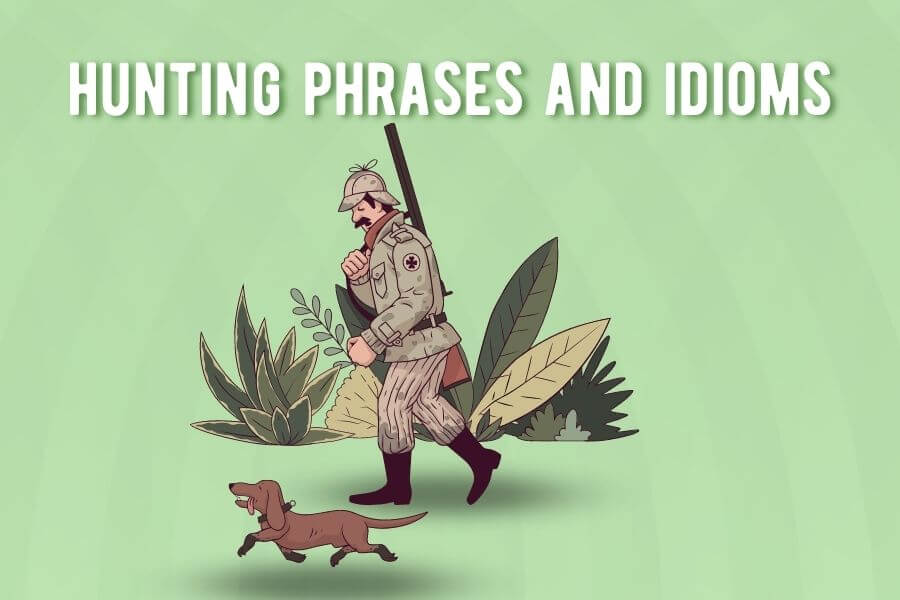Hunting phrases and idioms are expressions that relate to the activity of hunting, often used to convey meaning in a more vivid or metaphorical way.
These phrases can encompass various aspects of the hunting experience, from the pursuit of game to the broader themes of strategy, patience, and determination.
Familiarity with these phrases not only enhances your vocabulary but also enriches your understanding of language as it pertains to outdoor activities and life lessons.

Important Points:
- Cultural Significance: Hunting idioms often reflect the cultural importance of hunting in various societies. In many cultures, hunting is not just a means of sustenance but also a rite of passage and a source of tradition. Understanding these phrases can provide deeper insights into cultural practices and values.
- Metaphorical Uses: Many hunting phrases are used metaphorically in everyday speech, conveying concepts such as focus, perseverance, and the idea of pursuing goals. For example, phrases like “hunting for a job” or “on the hunt for knowledge” illustrate how hunting terminology can be applied to different life situations.
- Common Hunting Phrases and Idioms:
– “Sitting duck”: Refers to someone or something that is easy to target or attack.
– “The hunt is on”: Indicates that a search or pursuit is actively underway.
– “Barking up the wrong tree”: Suggests a mistaken assumption or pursuing the wrong course of action.
– “Catch and release”: Often used in fishing, but can refer to the idea of pursuing something without permanent commitment.
– “Going for the kill”: Used when someone is trying to secure a final success or complete an objective decisively.
– “A bird in the hand is worth two in the bush”: Emphasizes that it is better to hold on to something you have than to risk it for something greater that you might not obtain.
– “To hunt high and low”: Means to search thoroughly in every possible place.
- Usage in Conversation: Incorporating these phrases into conversations can add color and depth to your speech. For instance, saying, “I’m not just sitting back; I’m on the hunt for new opportunities this year,” communicates determination and proactivity.
- Origins and Evolution: Understanding the origins of these phrases can reveal much about historical hunting practices and societal values. Words and phrases evolve, often shaped by changes in society’s attitude towards hunting and nature.
As we dive deeper into the “complete list of hunting phrases and idioms,” we will explore comprehensive definitions, examples of usage, and the cultural contexts behind these expressions.
This exploration will not only expand your vocabulary but also help you appreciate the interplay between language and human experience in the world of hunting.
In examining the rich tapestry of hunting phrases and idioms, we encounter a linguistic landscape that is both descriptive and evocative, mirroring the complexities and nuances of the hunting experience itself.
These expressions encapsulate not only the practical aspects of the hunt but also the emotional and philosophical reflections that arise from pursuing a target—whether it be game in the woods or goals in life.
By exploring idioms such as “sitting duck” or “barking up the wrong tree,” we unearth not only the colorful visual imagery associated with hunting but also the timeless human behaviors and strategies that transcend the outdoor experience.
The language of hunting resonates deeply with themes of risk, reward, and the relentless pursuit of one’s desires.
Moreover, hunting idioms serve as a testament to our connection with nature and the lessons it imparts.
Whether one is an avid hunter or simply appreciates the metaphorical richness of the language, these phrases provide insight into human ambition and the various paths we traverse in search of what we aspire to achieve.
Through modern pedagogical approaches, such as the 2025 Method, we can engage with these expressions in interactive ways—turning their meanings into practical applications through discussions, role-playing scenarios, and creative writing exercises.
This method not only enhances retention but also allows learners to immerse themselves in the dialogues that these phrases inspire.
Ultimately, a mastery of hunting phrases and idioms equips individuals with more than just vocabulary; it provides them with a framework for understanding life’s pursuits and challenges.
Engaging with these expressions invites storytellers, professionals, and everyday communicators alike to reflect on their journeys, transforming the simple act of speaking into an engaging narrative of human aspiration and connection with the wild.
“Don’t miss this YouTube video for a complete list of hunting phrases and idioms!”
You might also enjoy: Top 100 Commonly Used Verbs That Start With D [2024]
Complete List of “Hunting” Phrases and Idioms
call off the dogs
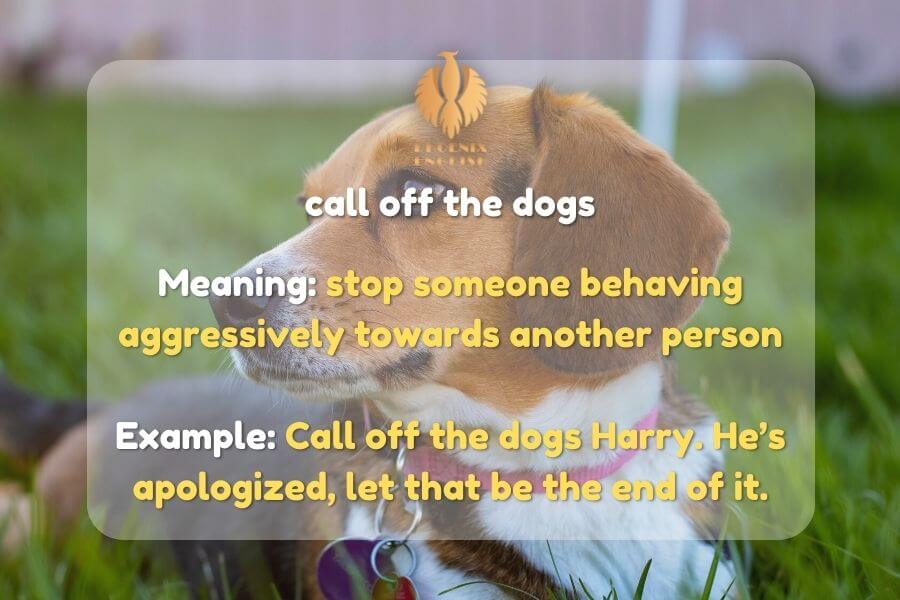
Meaning: stop someone behaving aggressively towards another person
Example: Call off the dogs Harry. He’s apologized, let that be the end of it.
Hotshot
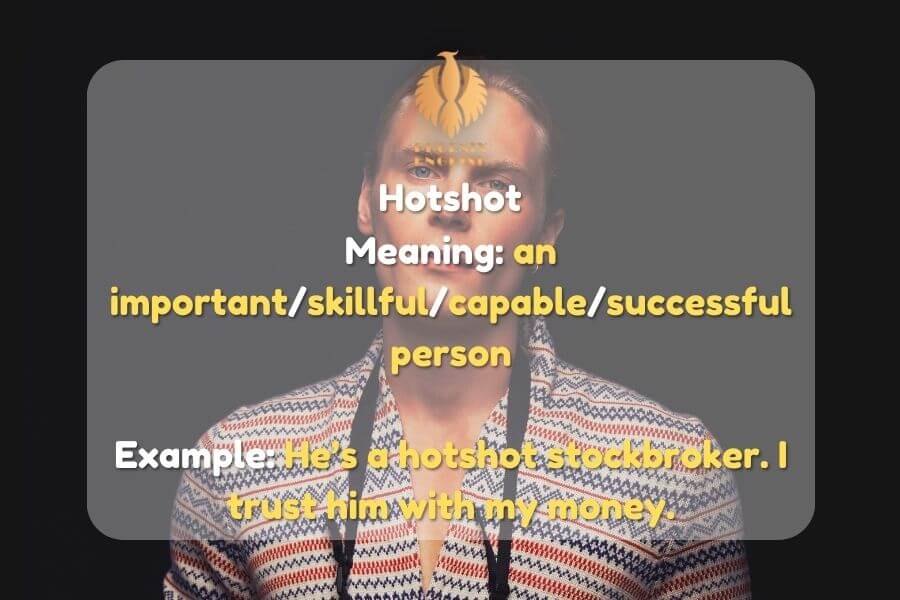
Meaning: an important/skillful/capable/successful person
Example: He’s a hotshot stockbroker. I trust him with my money.
bark up the wrong tree
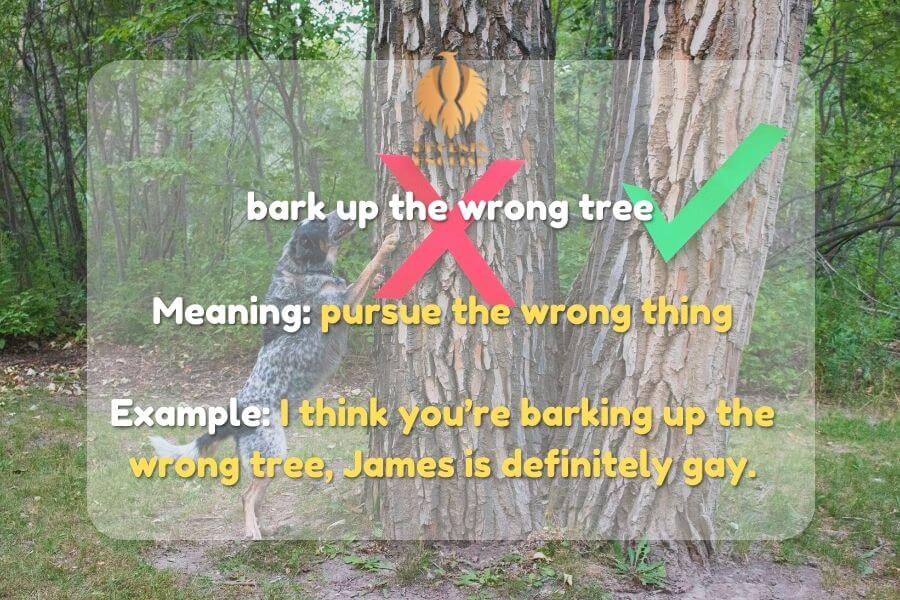
Meaning: pursue the wrong thing
Example: I think you’re barking up the wrong tree, James is definitely gay.
You might also enjoy:Looking Forward To Seeing You: Grammar + Examples[2025]
hound someone
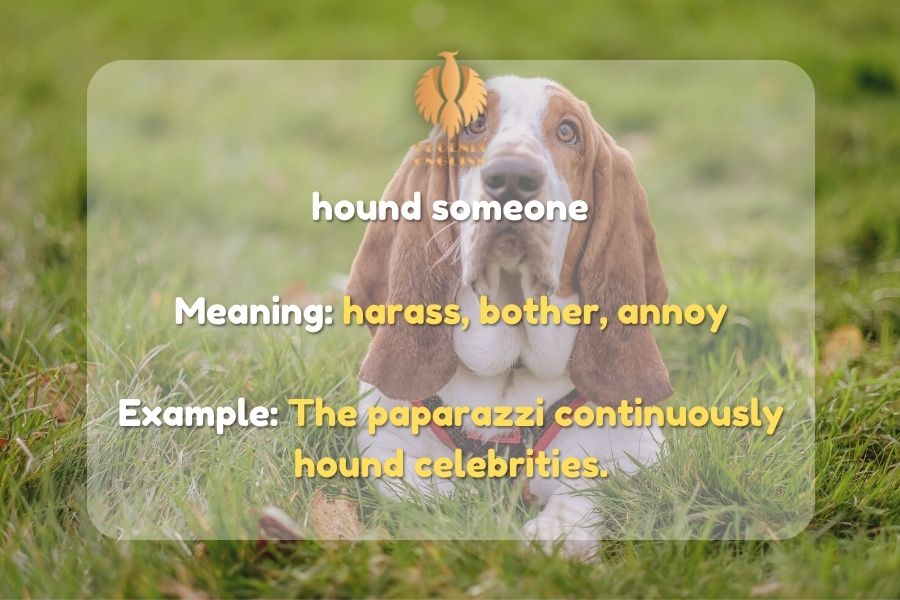
Meaning: harass, bother, annoy
Example: The paparazzi continuously hound celebrities.
long shot
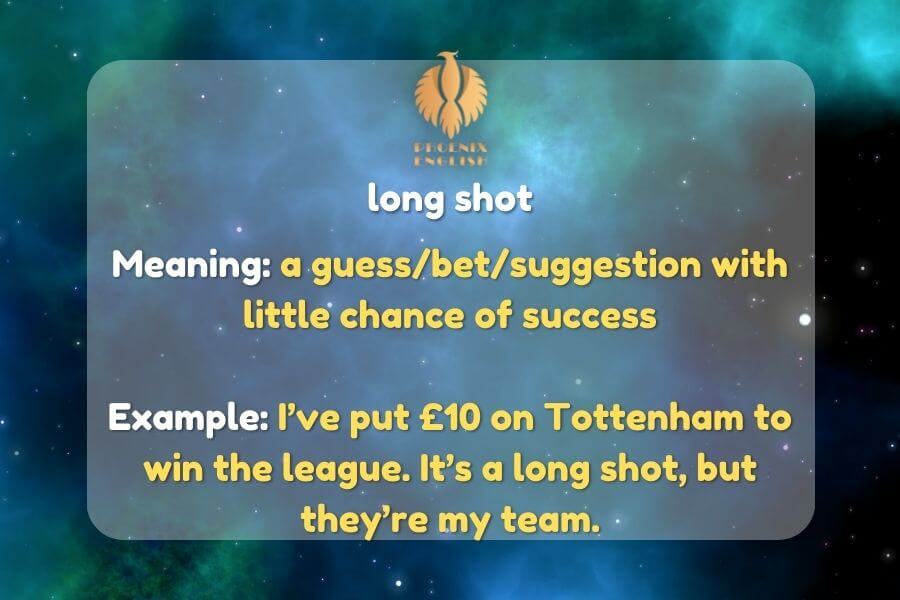
Meaning: a guess/bet/suggestion with little chance of success
Example: I’ve put £10 on Tottenham to win the league. It’s a long shot, but they’re my team.
not by a long shot
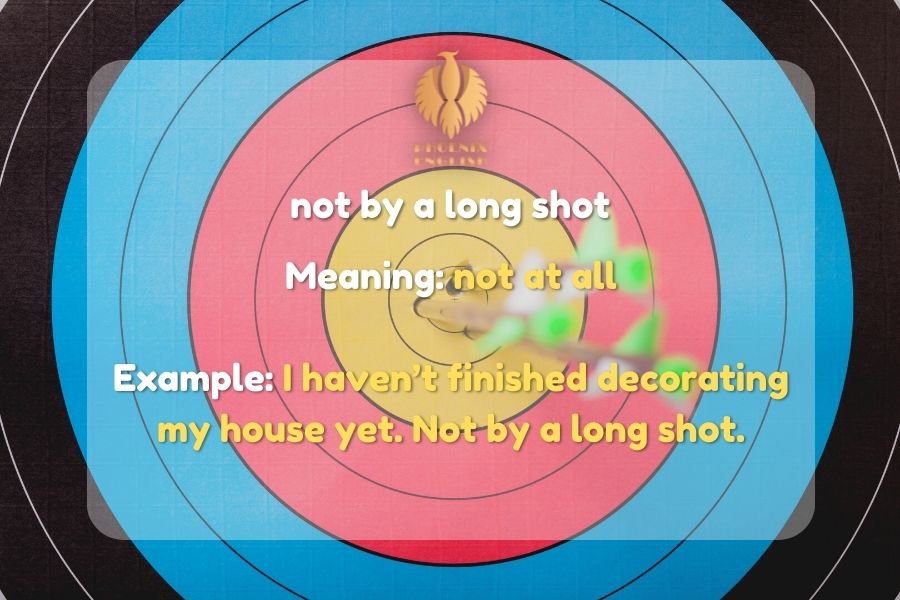
Meaning: not at all
Example: I haven’t finished decorating my house yet. Not by a long shot.
keep at bay
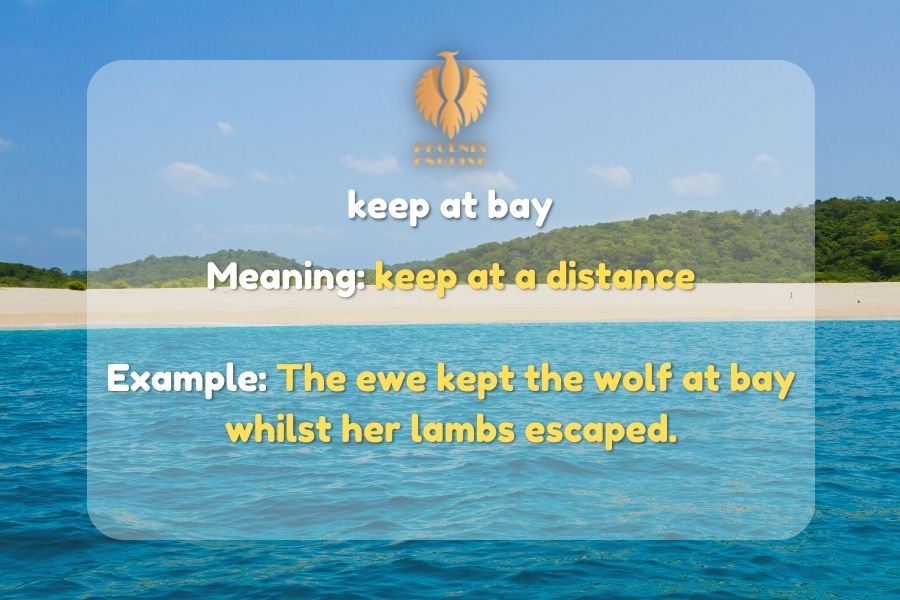
Meaning: keep at a distance
Example: The ewe kept the wolf at bay whilst her lambs escaped.
You might also enjoy:Emersion Vs Immersion: Meaning, Differences, and Examples
sitting duck
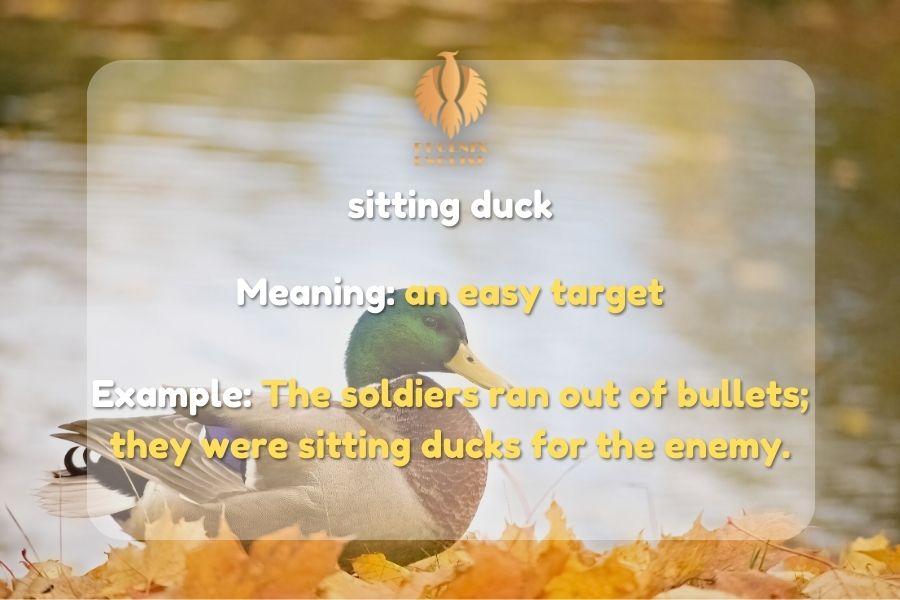
Meaning: an easy target
Example: The soldiers ran out of bullets; they were sitting ducks for the enemy.
be in the hunt
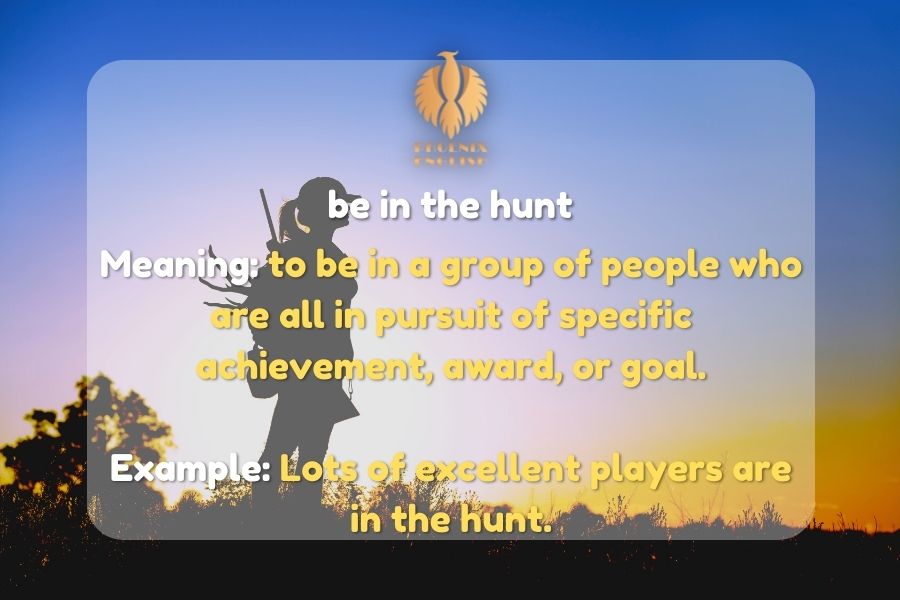
Meaning: to be in a group of people who are all in pursuit of specific achievement, award, or goal.
Example: Lots of excellent players are in the hunt.
run rings around
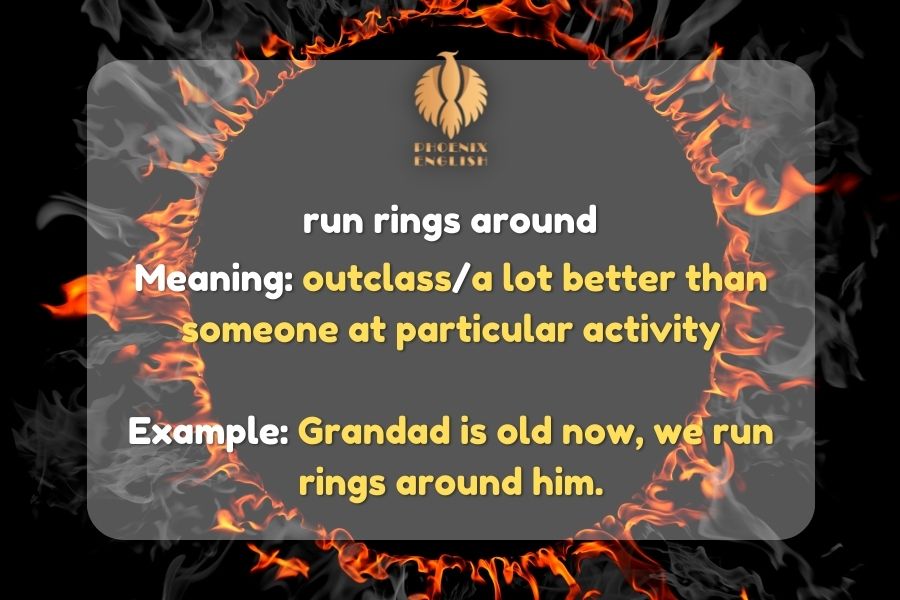
Meaning: outclass/a lot better than someone at particular activity
Example: Grandad is old now, we run rings around him.
have a dog in the hunt
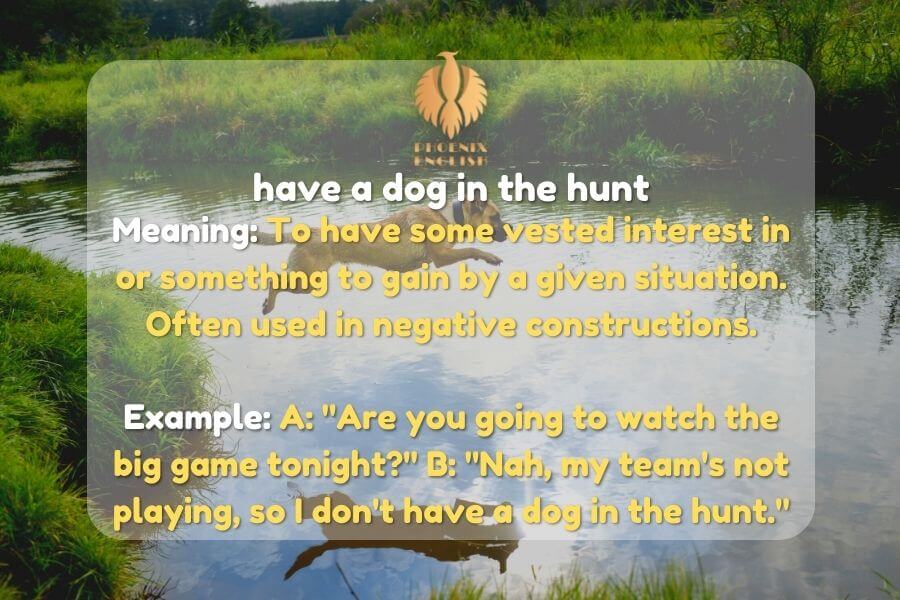
Meaning: To have some vested interest in or something to gain by a given situation. Often used in negative constructions.
Example: A: “Are you going to watch the big game tonight?” B: “Nah, my team’s not playing, so I don’t have a dog in the hunt.”
hunt for (someone or something)
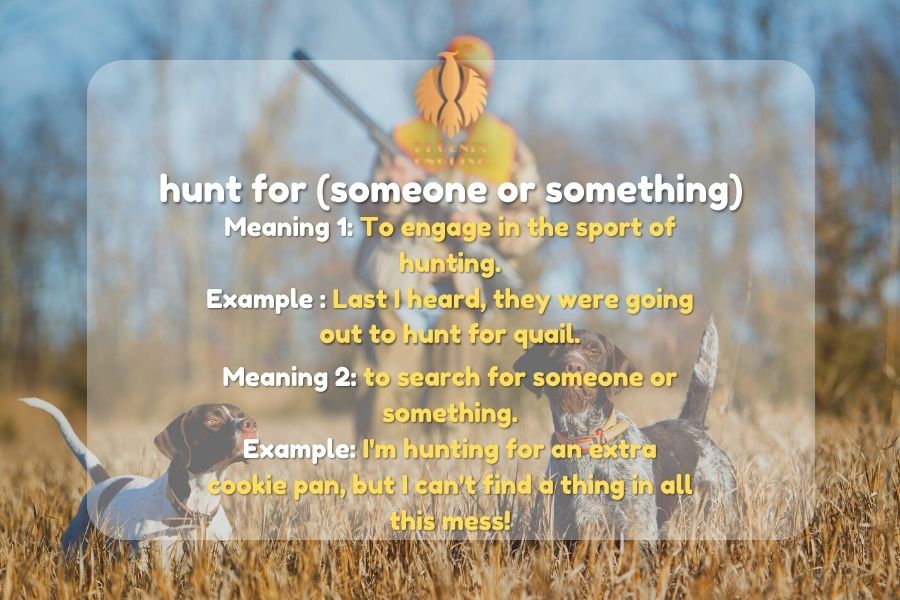
Meaning 1: To engage in the sport of hunting.
Example: Last I heard, they were going out to hunt for quail.
Meaning 2: to search for someone or something.
Example: I’m hunting for an extra cookie pan, but I can’t find a thing in all this mess!
You Might Also Enjoy: Top 60 Most Common Simple Sentences In English
hunt after (someone or something)
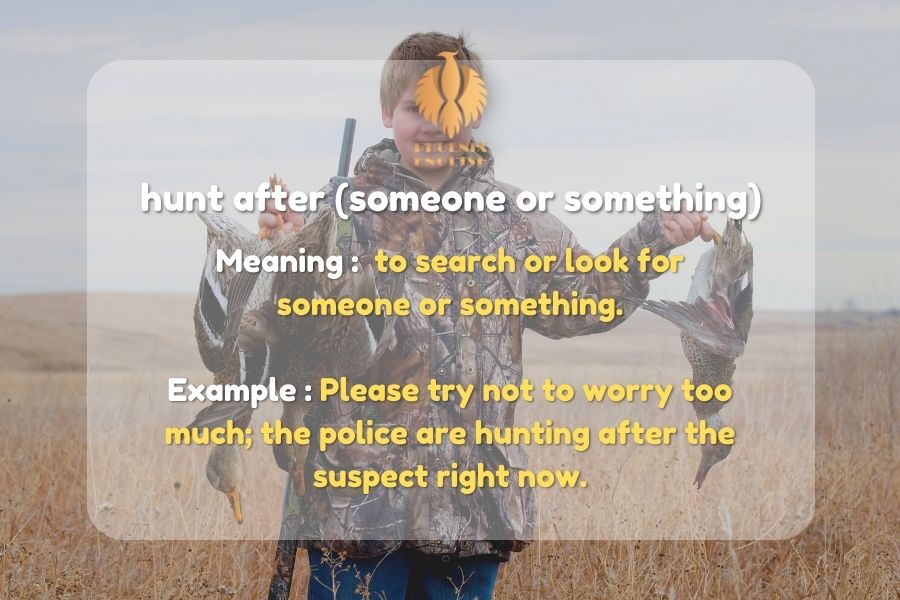
Meaning: to search or look for someone or something.
Example: Please try not to worry too much; the police are hunting after the suspect right now.
hunt high and low (for someone or something)
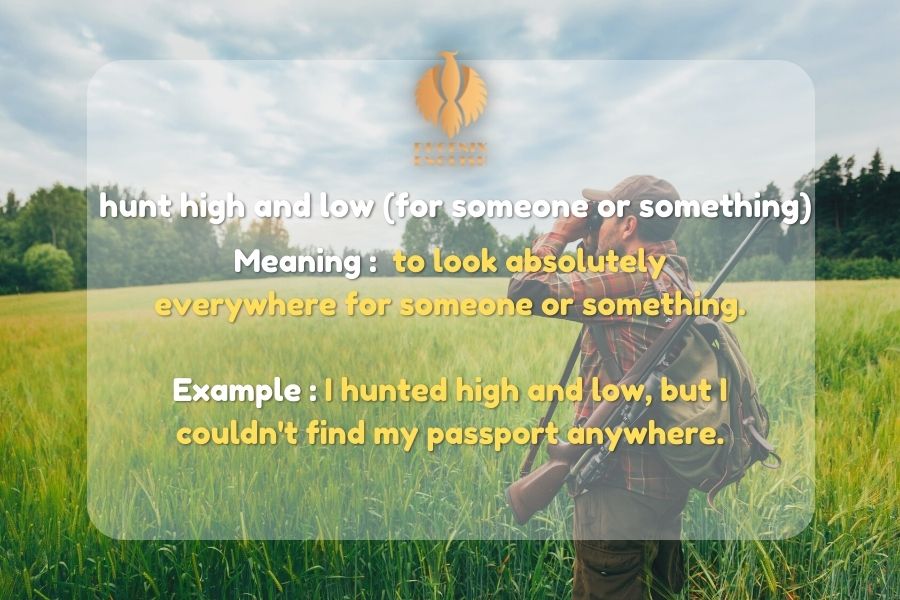
Meaning: to look absolutely everywhere for someone or something.
Example: I hunted high and low, but I couldn’t find my passport anywhere.
hunt through (something) (for something)
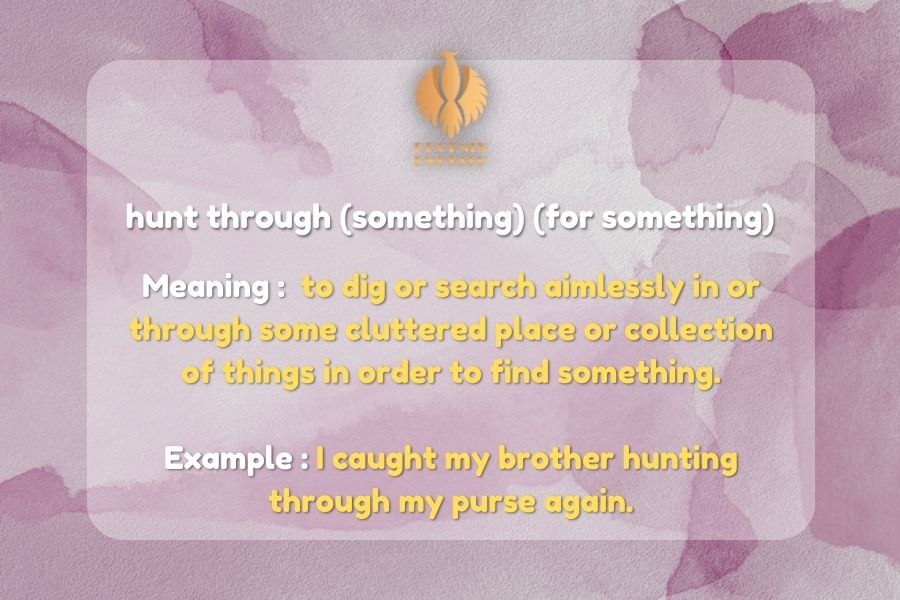
Meaning: to dig or search aimlessly in or through some cluttered place or collection of things in order to find something.
Example: I caught my brother hunting through my purse again.
hunting and pecking
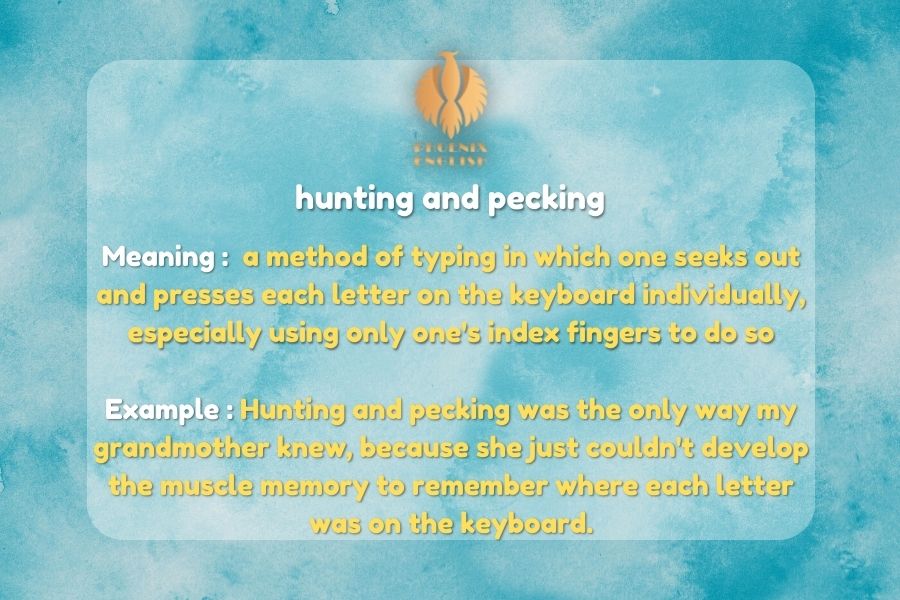
Meaning: a method of typing in which one seeks out and presses each letter on the keyboard individually, especially using only one’s index fingers to do so.Example: Hunting and pecking was the only way my grandmother knew, because she just couldn’t develop the muscle memory to remember where each letter was on the keyboard.
hunt the gowk
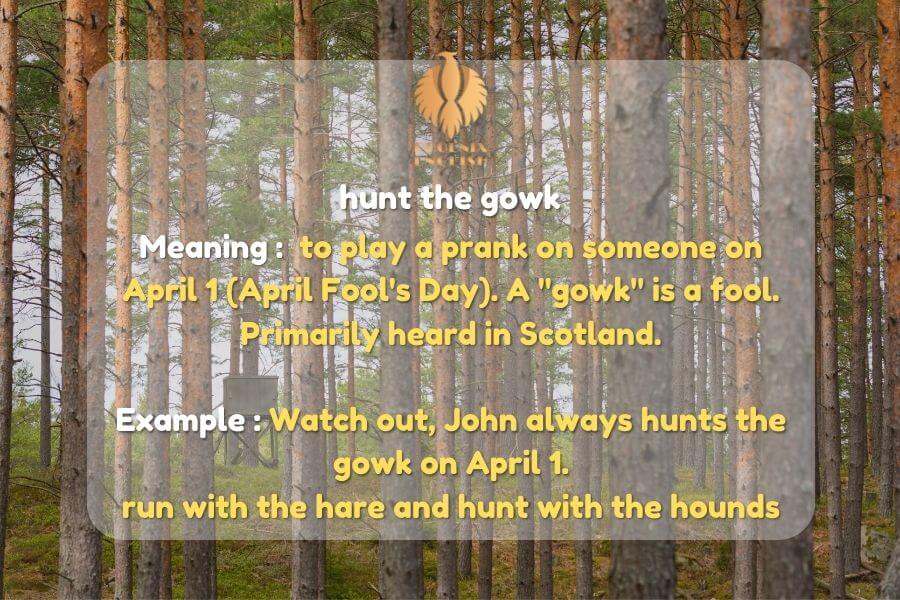
Meaning: to play a prank on someone on April 1 (April Fool’s Day). A “gowk” is a fool. Primarily heard in Scotland.
Example: Watch out, John always hunts the gowk on April 1.
You might also enjoy:How Are You Fairing or Faring? Differences + Examples
run with the hare and hunt with the hounds
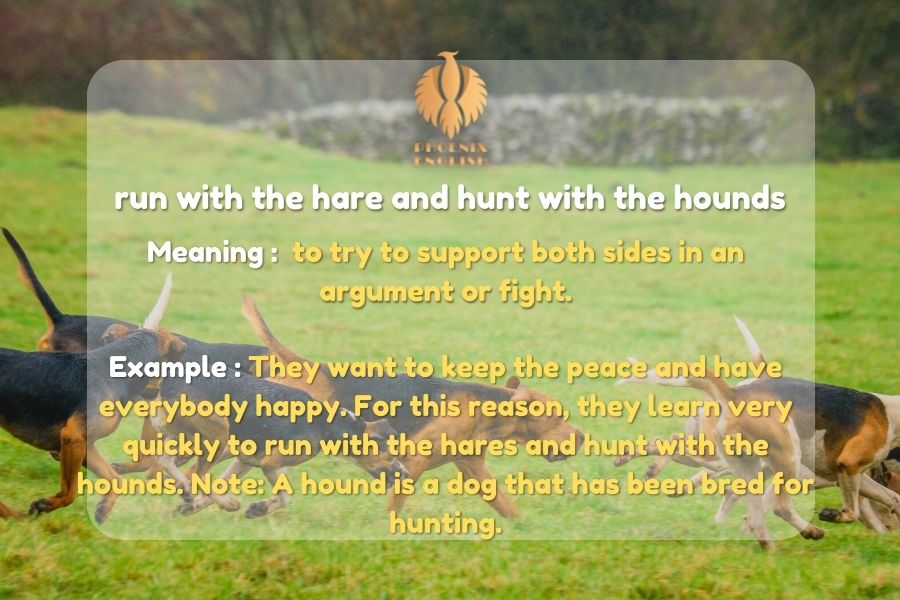
Meaning: to try to support both sides in an argument or fight.
Example: They want to keep the peace and have everybody happy. For this reason, they learn very quickly to run with the hares and hunt with the hounds. Note: A hound is a dog that has been bred for hunting.
hunt someone or something down
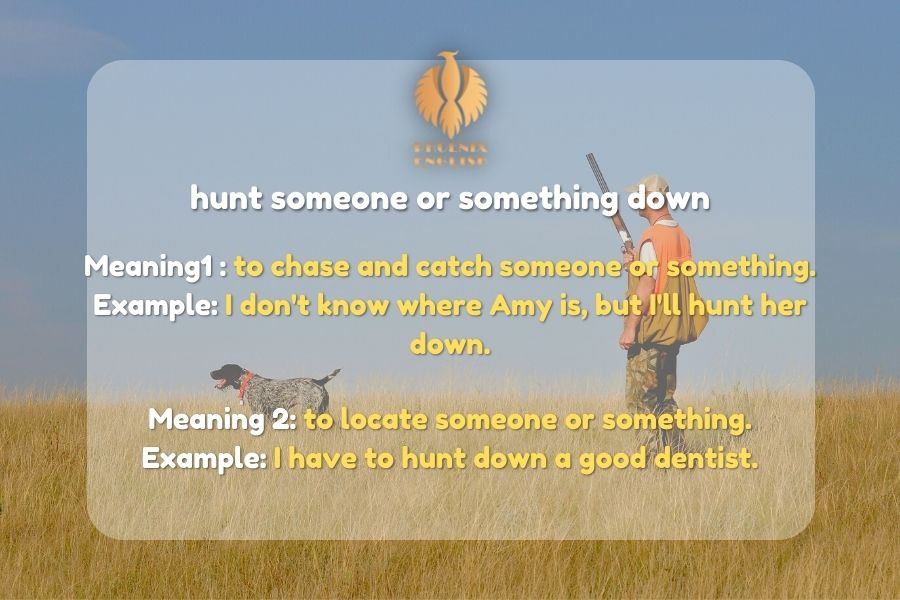
Meaning 1: to chase and catch someone or something.
Example: I don’t know where Amy is, but I’ll hunt her down.
Meaning 2: to locate someone or something.
Example: I have to hunt down a good dentist.
hunt someone or something out
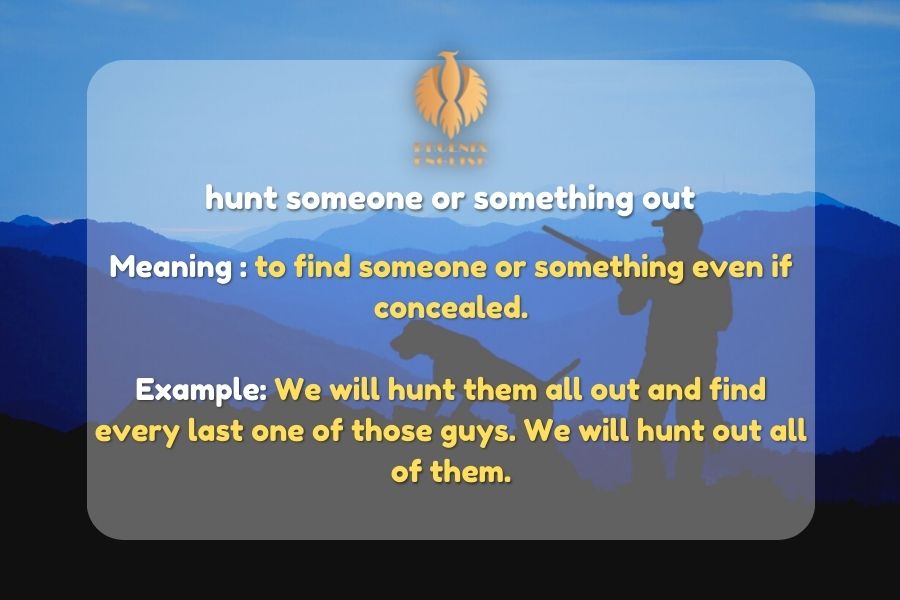
Meaning: to find someone or something even if concealed.
Example: We will hunt them all out and find every last one of those guys. We will hunt out all of them.
You might also enjoy:Too Cute Meaning Vs To Cute (To Vs Too) + Examples
the/(one’s) old hunting grounds
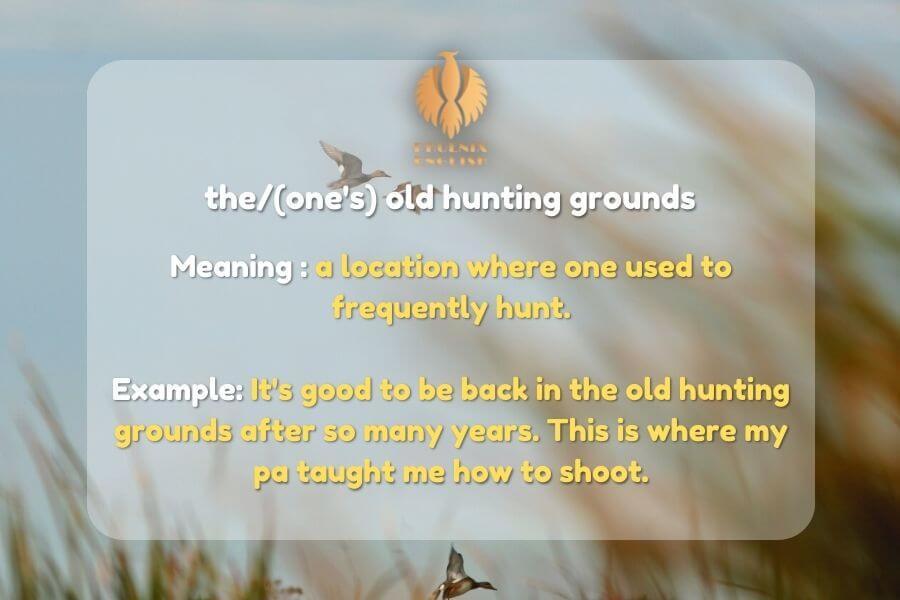
Meaning: a location where one used to frequently hunt.
Example: It’s good to be back in the old hunting grounds after so many years. This is where my pa taught me how to shoot.
happy hunting ground
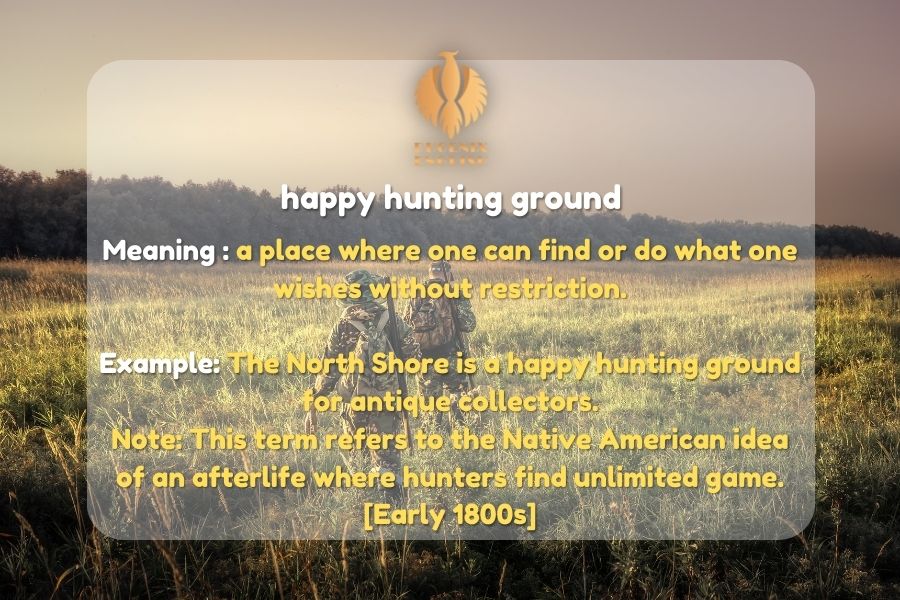
Meaning: a place where one can find or do what one wishes without restriction.
Example: The North Shore is a happy hunting ground for antique collectors.
Note: This term refers to the Native American idea of an afterlife where hunters find unlimited game. [Early 1800s]
be on a witch hunt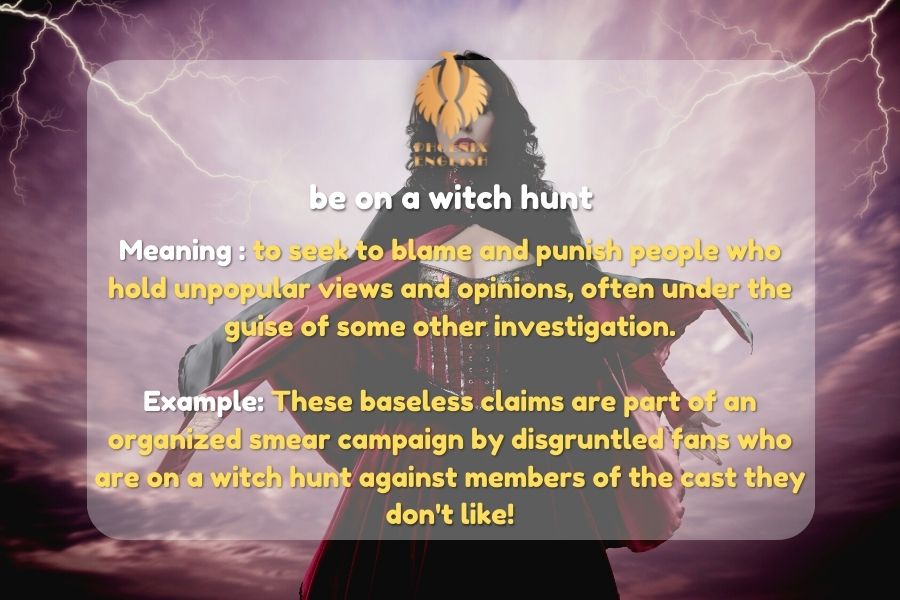
Meaning: to seek to blame and punish people who hold unpopular views and opinions, often under the guise of some other investigation.
Example: These baseless claims are part of an organized smear campaign by disgruntled fans who are on a witch hunt against members of the cast they don’t like!
that old dog won’t hunt (old-fashioned Primarily heard in US)
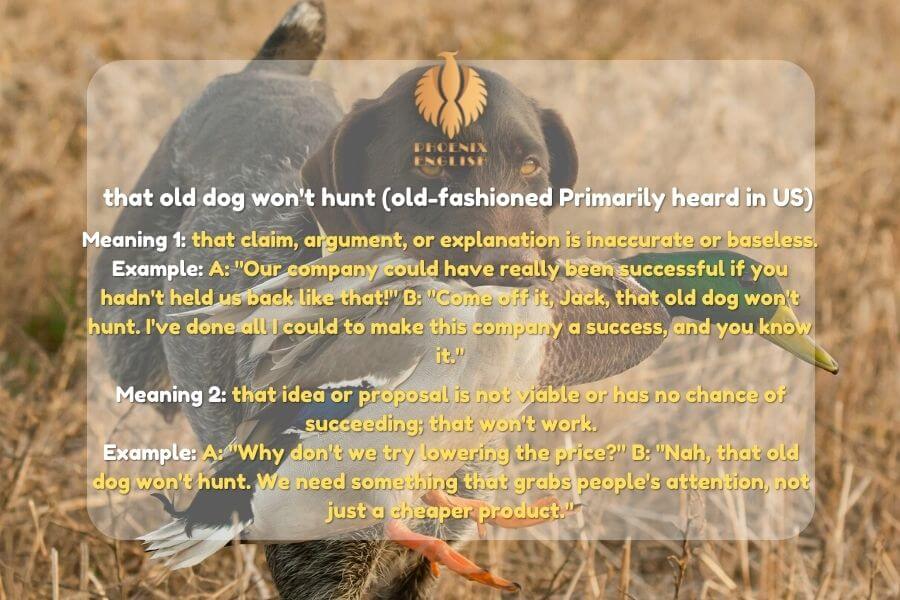
Meaning 1: that claim, argument, or explanation is inaccurate or baseless.
Example: A: “Our company could have really been successful if you hadn’t held us back like that!”
B: “Come off it, Jack, that old dog won’t hunt. I’ve done all I could to make this company a success, and you know it.”
Meaning 2: that idea or proposal is not viable or has no chance of succeeding; that won’t work.
Example: A: “Why don’t we try lowering the price?”
B: “Nah, that old dog won’t hunt. We need something that grabs people’s attention, not just a cheaper product.”
hunt where the ducks are
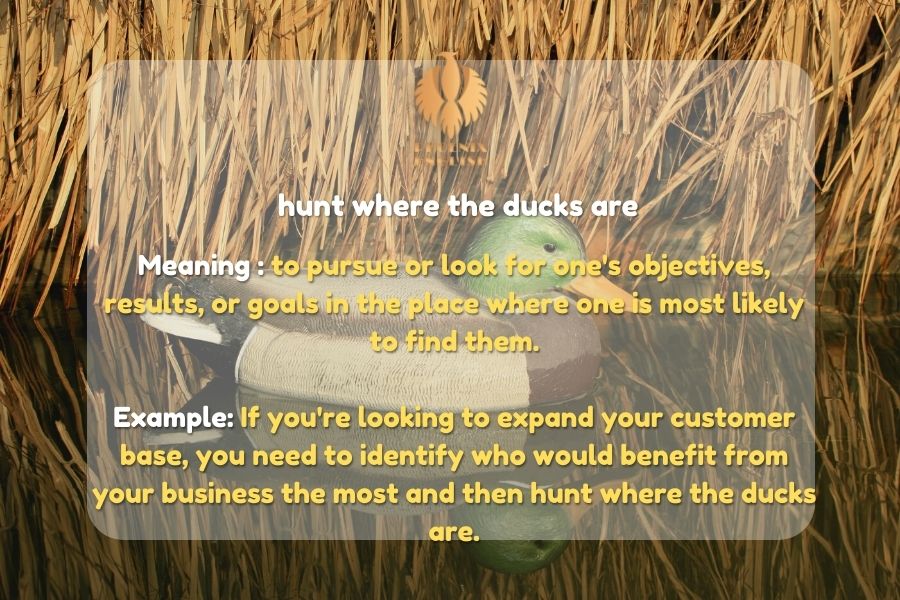
Meaning: to pursue or look for one’s objectives, results, or goals in the place where one is most likely to find them.
Example: If you’re looking to expand your customer base, you need to identify who would benefit from your business the most and then hunt where the ducks are.
You might also enjoy:What Kind of Vs What Kinds of – Differences + Examples [2025]
snipe hunt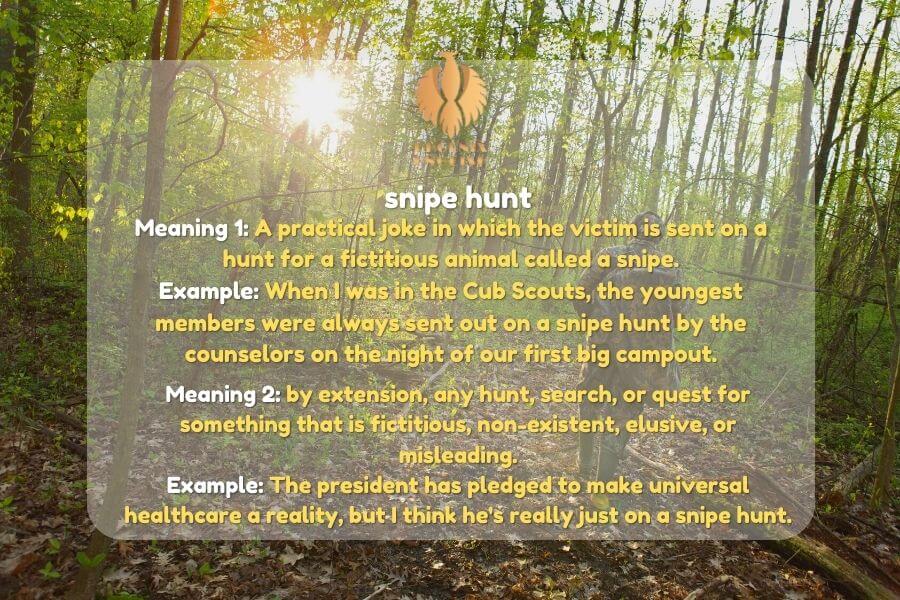
Meaning 1: A practical joke in which the victim is sent on a hunt for a fictitious animal called a snipe.
Example: When I was in the Cub Scouts, the youngest members were always sent out on a snipe hunt by the counselors on the night of our first big campout.
Meaning 2: by extension, any hunt, search, or quest for something that is fictitious, non-existent, elusive, or misleading.
Example: The president has pledged to make universal healthcare a reality, but I think he’s really just on a snipe hunt.
grinning like a shot fox
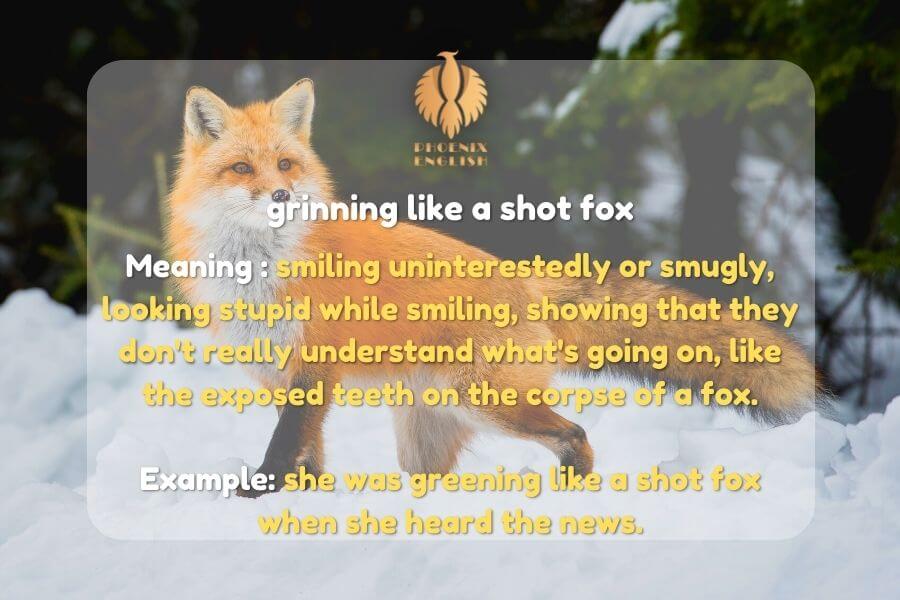
Meaning: smiling uninterestedly or smugly, looking stupid while smiling, showing that they don’t really understand what’s going on, like the exposed teeth on the corpse of a fox.
Example: she was greening like a shot fox when she heard the news.
tall enough to hunt geese with a rake
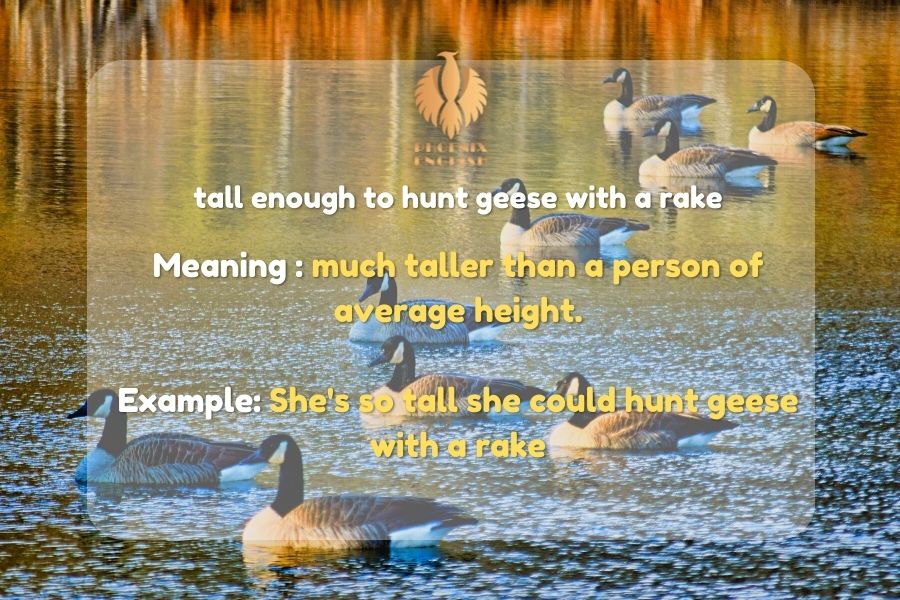
Meaning: much taller than a person of average height.
Example: She’s so tall she could hunt geese with a rake
Fair game
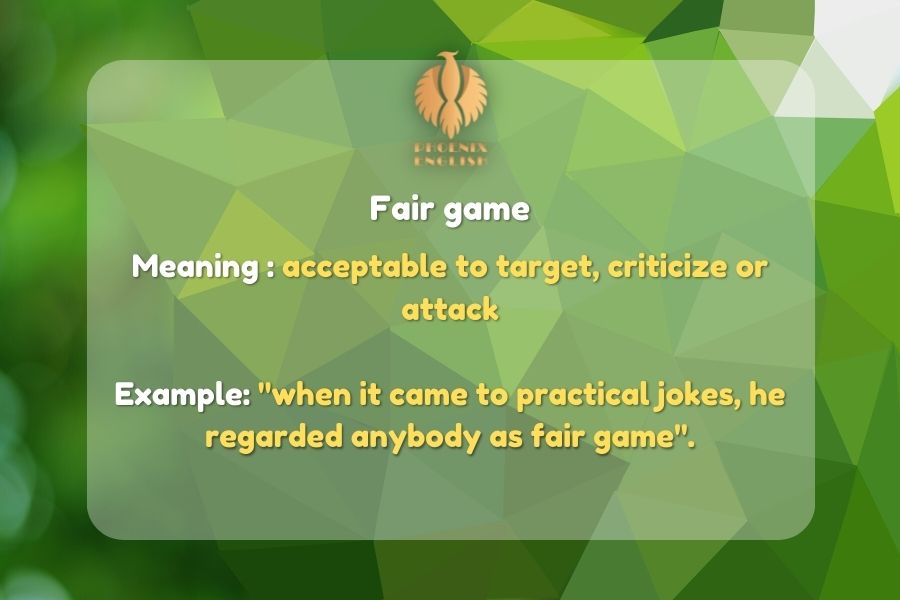
Meaning: acceptable to target, criticize or attack
Example: “when it came to practical jokes, he regarded anybody as fair game”.
Learn English for free and have fun with me!:Top 20 Awesome Party Expressions + Examples
Additional notes
It is worthwhile here to mention some important points about the action of hunting. Humans have been hunting for millions of years mainly for food and useful animal products (fur/hide, bone/tusks, horn/antler, etc.).
However, in recent years hunting has been forbidden for specific animals, mainly the ones who are in danger of extinction. That is because environmentalists have warned that extinction of any kind of animal anywhere in the world has proven to be destructive to the nature.
Therefore, ethics of hunting have been determined to decrease the danger of extinction. Ethical hunting means that a person knows and respects the game hunted, follows the law and behaves in a way that will satisfy what society expects of a hunter.
Ethical hunters are familiar with the places they hunt, the wildlife that live there and the way they should behave when hunting.
Grammatical points
I would also like to tell you important points about the word “hunt”. This word can be used as a noun and as a verb. The definition of each part of speech of this word is provided here together with examples.
You might also enjoy:Interested In or On: The Differences + Examples [2025]
Hunt (verb)
Meaning: to chase and try to catch and kill an animal or bird for food, sport, or profit
Example 1: Jack and Charlie like to hunt/go hunting (= chase and kill animals for sport) on the weekend.
Example 2: Cats like to hunt mice and birds.
Hunt (noun)
Meaning: a search for something or someone:
Example 1: After a long hunt we finally found a house we liked.
Example 2: Police are on the hunt (= searching) for the kidnappers.
Essential “hunting” vocabulary
Here I have provided for you the essential hunting vocabulary in the form of 4 notes:
Note 1: The animal that is being hunted is called the “game”and usually includes mammals and birds.
Note 2: A person participating in a hunt is called a “hunter” or (less commonly) “huntsman”.
Note 3:The natural area used for hunting is called a game reserve.
Note 4: The experienced hunter who helps organize a hunt and/or manage the game reserve is known as a gamekeeper.
20 points about using Hunting Phrases
- Hunting phrases are often used in a metaphorical or symbolic sense to convey various meanings, relating to determination, strategy, and patience.
- These phrases are frequently used in contexts beyond hunting to illustrate the pursuit of goals, challenges, or overcoming obstacles.
- They can serve as motivational cues to inspire individuals to stay focused, be resilient, and persevere in achieving their objectives.
- Hunting phrases often evoke imagery of nature, survival, and tactics, making them powerful tools for conveying deeper meanings and emotions.
- The use of hunting phrases can resonate with individuals on a primal level, tapping into instincts for survival, conquest, and accomplishment.
- These phrases can be employed in storytelling, speeches, or daily conversations to emphasize themes of courage, discipline, and triumph.
- Hunting phrases can also symbolize the idea of tracking down opportunities, seizing them, and making the most of them.
- They may emphasize the importance of preparation, strategy, and adaptability in pursuing one’s goals effectively.
- The imagery associated with hunting phrases can evoke feelings of anticipation, excitement, and the thrill of the chase.
- They can convey a sense of vigilant awareness, keen observation, and readiness to seize opportunities when they present themselves.
- Hunting phrases may underscore the significance of setting targets, being patient, and persisting through challenges to achieve success.
- They can also highlight the balance between aggression and caution, urging individuals to be assertive while exercising discernment in their pursuits.
- These phrases often celebrate the qualities of focus, determination, and resourcefulness needed to navigate obstacles and achieve victory.
- Hunters’ patience can teach us about the virtues of waiting for the right moment, biding time, and seizing opportunities when they arise.
- The concept of “hunting in packs” can promote the value of teamwork, collaboration, and leveraging collective strengths to accomplish shared objectives.
- Hunting phrases can inspire individuals to trust their instincts, rely on their skills, and adapt to changing circumstances to achieve their goals.
- They may highlight the importance of trial and error, learning from failures, and adjusting strategies to increase the chances of success.
- The use of hunting phrases can also emphasize the respect for nature, the environment, and the balance between human ambition and ecological harmony.
- These phrases can spark a sense of adventure, exploration, and discovery in individuals as they embark on their personal or professional journeys.
- Ultimately, hunting phrases serve as powerful metaphors for resilience, determination, and the relentless pursuit of excellence in various facets of life.
You might also enjoy:Where Does “How is your Day Going?” Originate From?
Frequently Asked Questions
1. Q: What is a hunting phrase or idiom?
A: A hunting phrase or idiom is a specific expression or saying used within the hunting community that encapsulates particular experiences, wisdom, or cultural references related to hunting practices.
These phrases enrich communication among hunters, allowing them to convey shared values, traditions, and lessons learned from their experiences in the wilderness.
2. Q: Why are phrases and idioms important in hunting culture?
A: Phrases and idioms play a crucial role in hunting culture as they serve not only to communicate but also to pass down knowledge and ethics from generation to generation.
They foster a sense of belonging among hunters, enabling them to express camaraderie and shared understanding about the challenges and joys of hunting, while often reflecting the deep connection between humans and nature.
3. Q: Can you provide an example of a common hunting idiom?
A: A widely recognized hunting idiom is “Barking up the wrong tree.” This phrase implies that someone is pursuing a mistaken or misguided line of thought or action.
In the context of hunting, it might be used when a hunter is looking for game in an area where they are unlikely to find it, suggesting more strategic thinking is needed or that they should consider alternative approaches.
4. Q: What does the idiom “A bird in the hand is worth two in the bush” imply in hunting?
A: This idiom conveys the idea that it is better to appreciate and hold onto what you currently have—such as a captured game—rather than risking it to pursue something potentially greater, but uncertain, like chasing after an elusive animal that may or may not be within reach.
It symbolizes the value of being prudent and recognizing the rewards of current efforts in hunting.
5. Q: How is the phrase “To take to the woods” commonly used?
A: The phrase “To take to the woods” means to retreat or escape into the wilderness, often referring to hunters who seek solace or isolation from the hustle and bustle of daily life.
It signifies a return to nature, suggesting both freedom and a desire to reconnect with the wild, making it a favored expression among outdoor enthusiasts and hunters.
6. Q: What does “The early bird gets the worm” mean in hunting contexts?
A: This idiom emphasizes the advantage of being proactive and taking initiative, particularly in the context of hunting. It suggests that hunters who arrive early at their location or prepare ahead of time are more likely to succeed in capturing game. The phrase encourages diligence and strategic planning, highlighting the rewards of readiness.
7. Q: What does the phrase “Chasing the Deer” refer to?
A: “Chasing the deer” can be used metaphorically to describe the pursuit of something elusive or difficult to obtain, akin to setting goals that require significant effort and strategy.
In actual hunting, it represents the physical act of following deer, but in broader contexts, it reflects the determination needed to achieve challenging objectives in various endeavors.
8. Q: What does it mean to “Put all your Eggs in One Basket” in hunting?
A: This idiom advises against risking everything on a singular venture without diversifying options.
In hunting, it might refer to relying solely on one type of bait or hunting method. Instead, it suggests creating a strategy that includes various approaches, enhancing the chances of a successful hunt and mitigating the risk associated with failure.
9. Q: How does “Crossing the line” apply in a hunting context?
A: “Crossing the line” is used to describe a situation where an individual breaks ethical or legal boundaries, particularly in hunting. This could involve actions such as hunting out of season, trespassing on private property, or using prohibited methods. It serves as a cautionary reminder of the importance of adhering to regulations and ethical standards within the hunting community.
10. Q: What does “Leave no stone unturned” mean in hunting?
A: This phrase means to make every possible effort in a search or pursuit, suggesting thoroughness and determination. In hunting, it implies that a hunter should explore every avenue, investigate all possibilities, and check all potential areas to increase their chances of success, illustrating a commitment to diligence in achieving goals.
11. Q: Can you explain “Running with the wolves” in a hunting phrase?
A: “Running with the wolves” refers to engaging with and becoming part of a group that shares similar wild instincts or lifestyles.
In hunting, it symbolizes the camaraderie and shared experiences among hunters, as well as their connection to nature and the primal aspects of life. It highlights the behavior of hunters who bond over their passion for the outdoors.
12. Q: What does “Shoot from the hip” mean?
A: In a hunting context, “shooting from the hip” refers to taking quick, instinctive shots without meticulous planning or consideration of the outcome.
This expression embodies decisiveness and spontaneity, which can lead to errors or missed targets, emphasizing the risks and rewards of quick actions during a hunt.
13. Q: How is “Stalking your Prey” used metaphorically?
A: “Stalking your prey” metaphorically suggests a careful and strategic approach to pursuing goals or objectives, much like a hunter stealthily approaches their target. This expression emphasizes patience, planning, and meticulous execution in order to achieve success, applicable to various competitive or professional situations.
14. Q: What does “Out of the woods” signify?
A: “Out of the woods” means to have moved past a difficult or dangerous situation. In a hunting context, it can indicate that a hunter has successfully navigated challenging circumstances, such as adverse weather or difficult terrain, reflecting a sense of relief and accomplishment after overcoming obstacles.
15. Q: How is the phrase “Caught in the crossfire” relevant to hunting?
A: “Caught in the crossfire” generally refers to being unintentionally involved in a conflict or struggle. In hunting, it can describe the scenario where an individual may be caught in close proximity to another hunter’s shots or is affected by another’s actions, emphasizing the importance of safety and awareness in shared hunting environments.
16. Q: What does “Hunt with the Hounds” imply?
A: The phrase “hunt with the hounds” refers to collaborating with a group, often implying teamwork and cooperation. In hunting, it signifies working alongside fellow hunters or trained dogs to pursue game effectively.
It underscores the value of community and united efforts in achieving common objectives.
17. Q: What does it mean to “Have a shot at Something”?
A: To “have a shot at something” means to have an opportunity to achieve a specific goal or target. In a hunting context, it refers to the chance to aim and take a shot at game, but it can also be used more broadly to denote any aspiration or attempt to succeed in a given venture.
18. Q: How can “Scent of a deer” be an idiom in hunting?
A: “Scent of a deer” metaphorically refers to being aware of the subtle cues and signals in a situation, highlighting the ability to detect presence or opportunity, similar to how a skilled hunter pays attention to the scent trails left by deer. It emphasizes the importance of observation and intuition.
19. Q: What does “The buck stops here” mean in a hunting scenario?
A: “The buck stops here” signifies that the ultimate responsibility for decisions or actions lies with the individual being addressed. In hunting, it serves as a reminder that hunters are accountable for their choices, whether related to ethical practices or decision-making, underscoring the importance of ownership and integrity.
20. Q: What role do hunting phrases and idioms play in storytelling?
A: Hunting phrases and idioms enrich storytelling by adding depth and resonance to narratives shared among hunters. They help convey experiences, values, and lessons learned in the field, allowing for relatable connections and enhancing the cultural tapestry of hunting traditions, making tales more vivid and impactful.
Concluding note
In today’s lesson, I provided for you a complete list of “hunting” phrases and idioms. I mentioned some important points about the action of hunting as well because I thought it was necessary for you know about them.
At the end, I mentioned some grammatical points about the word “hunt” and I provided the essential “hunting” vocabulary that you need to know when talking or writing about this issue.
I hope this lesson was useful and practical to you. Visit my page for more interesting English lessons!

Hi, welcome to my blog! My name is Omid and I am thrilled to have you here! I am an English language teacher with 12 years of experience and hold multiple international certifications (TESOL, IELTS, TOEFL, PTE, CELTA). Additionally, I hold a PhD in Applied Linguistics with a specialization in Teaching English as a Second Language (TESL), which fuels my passion for teaching English and assisting others in mastering the language. To me, nothing is more rewarding than helping individuals enhance their English language abilities through various methods. So, let’s embark on this journey of learning English together.

